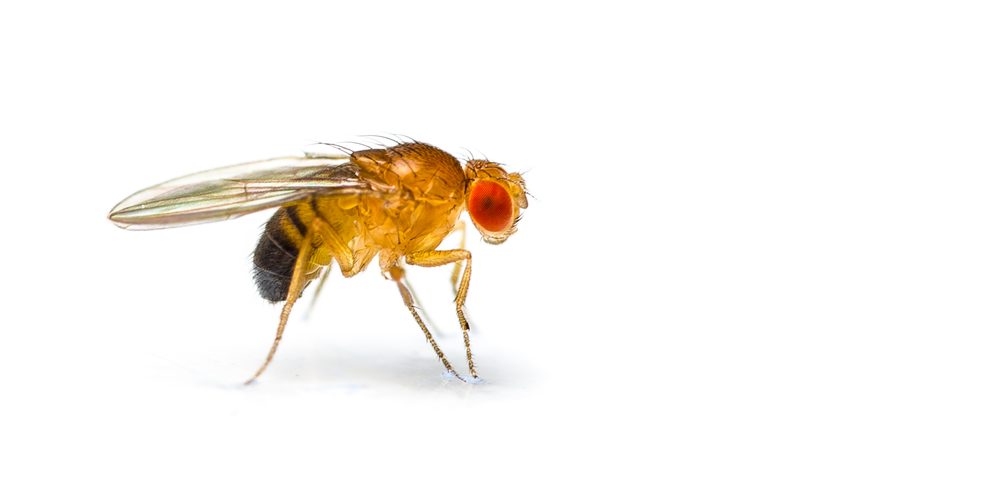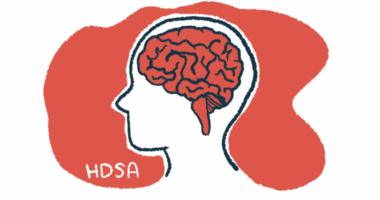Subtle Changes in Circadian Clock Seen to Ease Buildup of Mutant Protein in Huntington Fly Model

Mild genetic or environmental changes that upset the circadian clock (our internal sleep-wake cycle) may work to diminish the toxicity of mutant huntingtin, the protein involved in Huntington’s disease and nerve cell death, an early study in a fruit fly model found.
The study, “Circadian Clocks Function in Concert with Heat Shock Organizing Protein to Modulate Mutant Huntingtin Aggregation and Toxicity,” was published in Cell Reports.
Perturbations in the circadian clock that disrupt sleep and affect daily activities are known to be common among patients with neurodegenerative disorders, such as Alzheimer’s, Parkinson’s and Huntington’s.
“In many cases, the circadian or sleep disruption precedes the appearance of the diagnostic symptoms of the disease, suggesting that they are impaired early in the disease process,” the scientists wrote. “Yet definitive evidence that the circadian clock can impact neurodegeneration in human disease models has been lacking.”
In the specific case of Huntington’s disease, some studies in humans and in animal models of disease have shown that mutant huntingtin (mHTT) — the protein responsible for the formation of toxic aggregates inside nerve cells — can disrupt the circadian clock, leading to behavioral changes and neuronal alterations.
But the molecular mechanisms underlying this process and the specific contribution of the circadian clock for the progression of Huntington’s disease are still poorly understood.
Researchers at Northwestern University sought answers to these questions by studying a fruit fly model of Huntington’s disease.
As in patients, fruit flies producing the mHTT protein have altered sleep-wake cycles, and symptoms that typify the disease like motor problems, evidence of neurodegeneration and damaging protein buildup in the brain that’s toxic to nerve cells.
“Normally, fruit flies wake up, get very active, then go to sleep and become inactive,” Ravi Allada, a circadian rhythms expert and the study’s lead author, said a news release. “It’s a 24-hour pattern. In the Huntington model, there is no rhythm. The flies wake up and fall asleep all the time.”
In their experiments, Allada and his team used two different methods to disrupt the flies’ circadian clocks to assess its effects on Huntington’s progression:
- Environmental changes, in which they altered the number of day/night hours from a 24-hour cycle (12 hours of light and darkness) to a 20-hour day (10 hours of light and darkness)
- Genetic changes, in which they mutated one of the core genes involved in the control of the circadian clock, called Clk.
“We essentially gave the flies jet lag for every day of their lives,” Allada said. “It’s like traveling four hours east every day.”
In both experiments, they found that “jet-lagged” flies had fewer mHTT toxic protein aggregates and lesser neuronal cell death.
“It seems counter-intuitive, but we showed that a little bit of stress is good,” Allada said, and the study emphasized that changes made were mild. “We subtly manipulated the circadian clock, and that stress appears to be neuroprotective.”
Next, the researchers did a genetic screening to look for other circadian clock genes that might be involved in protecting neurons from damage due to disease.
A top candidate identified was the Heat Shock Protein 70/90 Organizing Protein (Hop) gene, which regulates both the circadian clock and the folding of other proteins.
After knocking-down (silencing) Hop in flies producing mHTT, the team again found a lower production of toxic protein aggregates and fewer dead neurons. In addition, Hop silencing also restored those circadian clock perturbations caused by Huntington’s disease.
“We thought that inhibiting this gene that helps your proteins fold properly would make things worse, but they got better,” Allada said. “It again shows that a little bit of stress is probably good.”
The study noted that its “finding that the clock can modulate mHtt toxicity” may lead to new treatments. “One implication is that the clock could modulate various features of mHtt aggregate formation, dissociation, and/or degradation. … Notably, clock control of heat shock pathway components has also been observed in mammals. If a similar scenario is evident in human HDs [patients], then timed therapeutic interventions, termed chronotherapy, could be efficacious.”






